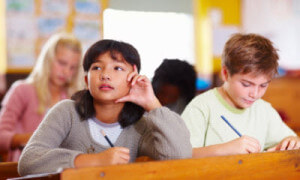 If your child is considered gifted, but is also in need of special education services, it is likely that he or she would be considered a twice-exceptional student, according to 2E. Students who fall into this category likely have exceptional abilities in one subject or area of study, while exhibiting weaknesses in another subject or aspect of learning. These twice-exceptional learners can often fall under the radar and be overlooked for the specific kinds of services they need in order to succeed academically. Knowing more about the characteristics, abilities and needs of these students can help you to become a better advocate for your child.
If your child is considered gifted, but is also in need of special education services, it is likely that he or she would be considered a twice-exceptional student, according to 2E. Students who fall into this category likely have exceptional abilities in one subject or area of study, while exhibiting weaknesses in another subject or aspect of learning. These twice-exceptional learners can often fall under the radar and be overlooked for the specific kinds of services they need in order to succeed academically. Knowing more about the characteristics, abilities and needs of these students can help you to become a better advocate for your child.
Categories of Twice-Exceptional Students
The characteristics of these students often fall into one of three different categories. Sometimes the extraordinary gifted qualities students demonstrate will overshadow any limitations, allowing problems to go unnoticed. They likely begin to fall behind in gifted classes. They may be considered underachievers who are not trying hard enough when they find themselves unable to compensate for their weaknesses.
Another common scenario involves children whose brilliant giftedness is hidden or overshadowed by learning problems or attention difficulties. These kinds of issues can hold a child back considerably and negatively affect the scores on IQ tests or other measurements. If learning issues are the primary focus, these students may end up in special education classes where they are likely to get bored and act out. They may even be told they have emotional disturbances.
Sometimes the gifted and problem areas seem to cancel each other out in students. In such cases, the individuals will present as students with average intelligence, going without programs to meet their high intellect, nor their academic difficulties.
Ways to Identify the Twice-Exceptional Student
Since there are federal laws that protect the rights of students who possess learning disabilities, twice-exceptional children who present with such issues will likely receive special education services to address their needs. There is no federal governmental requirement to meet the learning needs of gifted kids. Decisions regarding these programs are left to those at the state or local level. However, when it comes to state and local mandates regarding gifted education, there seems to little in the way of formal policy. Individual school districts tend to develop programs and policy surrounding gifted students, and often these programs are cut altogether due to budgetary constraints.
If you’re lucky, a teacher will notice patterns in your child and make efforts to have his or her unique educational needs met. More often than not, parents need to serve as advocates for their children when they suspect there are multiple educational needs that need to be considered. Early signs of a twice-exceptional learner include a noticeable and extreme talent level in a particular area like music or math, a significant difference in academic performance versus scores on aptitude tests and difficulty in processing information such as verbal directions. while there is no one test meant to identify twice-exceptional tendencies, you can ask your school to test your child for both giftedness and learning disabilities. It’s a starting point. It’s also a good idea to collaborate with teachers regarding observed characteristics, taking notes for your records.
Related Resource: Developmental Delays in Children
Ensuring your child receives the individual academic attention he or she needs may take advocacy on your part. However, with some individualized services in place, it’s possible for your twice-exceptional student to excel in school.



